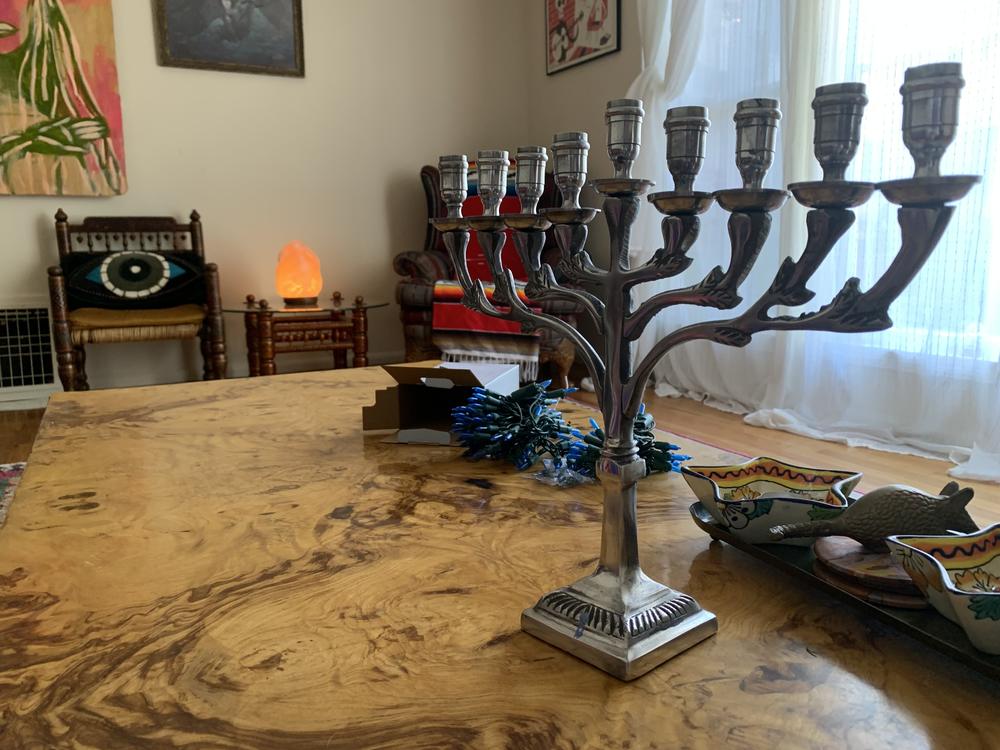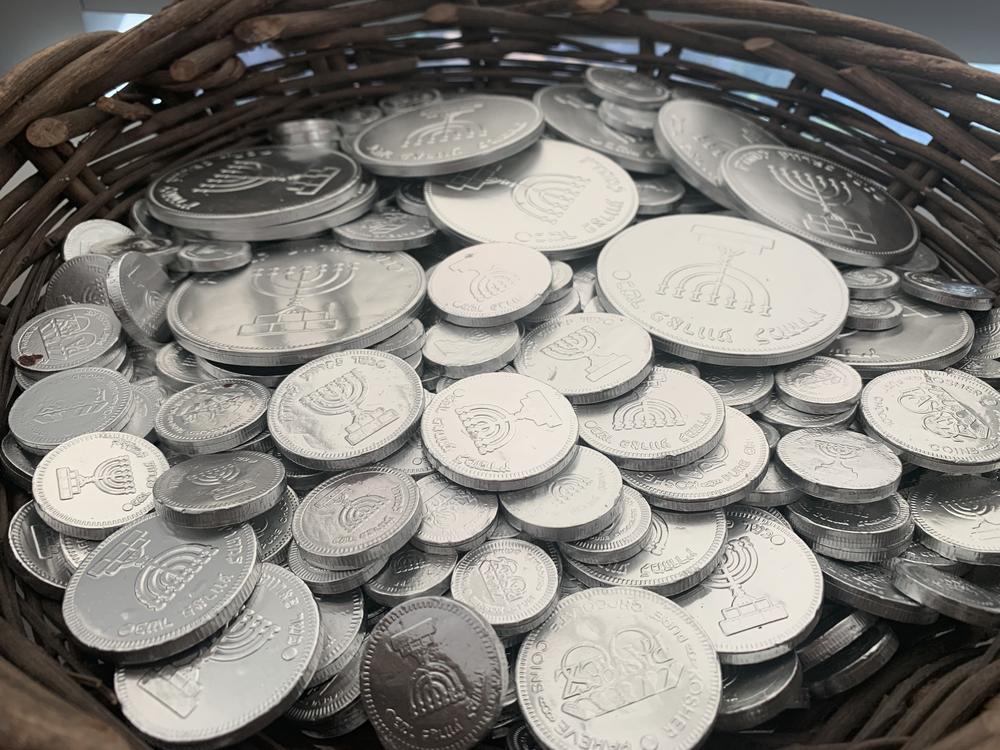Section Branding
Header Content
Hanukkah celebrations inspire Jewish joy despite war and increasing antisemitism
Primary Content
A central Hanukkah memory for Becca Cuellar is of the menorah in her childhood home.
"We had like a big brick fireplace and a wooden mantel," she says. "And I just specifically remember the wax melting on that. Wax everywhere, which is so fun and beautiful."
Now the 36-year-old who works in Hollywood casting celebrates in her own apartment with a new puppy and her fiancé. She has been preparing for days.
This week, Cuellar, who works from home, spent part of her lunch break decorating. She set the large silver-colored menorah on the coffee table and unboxed a string of blue lights.
"I'm going to put them over the door frame right here," she says, pointing to the entrance to the dining room. "That was the question, the discussion this morning: Do I put them over the window so we have blue light coming through the window? What do I want to look at the most?"
Figuring out how to celebrate the Jewish holiday is tricky for many, given the Israel-Hamas war — including Hamas still holding more than 100 Israeli hostages. Also a concern: the rise in antisemitism around the world and in the United States.
Cuellar says that this worry makes her more reluctant this year to decorate in ways that people passing by outside might see, such as putting the lights or the menorah in the window. Still, she's throwing a Hanukkah party Friday night.
"I feel like it's more important than ever to celebrate our joy, considering all of the antisemitism that's happening," she says. "We just really want to live our life as joyously as possible."
Cuellar is hosting people she knows well and people she has just met through a program organized by the group OneTable and the Jewish Federation of Greater Los Angeles' young adult initiative called NuRoots.
Bringing Jews together to celebrate
Chelsea Snyder runs NuRoots and likens her work bringing people together to the extra candle on a menorah that marks the eight nights of the holiday.
"The ninth prong is what we call a shamash candle, and that is the helper candle," says Snyder. "That's the candle you light to light the rest of the menorah. I see our role in the community as the shamash."
A goal of NuRoots and OneTable is for younger Jews to connect with each other and connect or reconnect to their faith and their community.
"A Jewish value that is prominent in Hanukkah is hosting and hospitality," she says. "So we wanted to empower our community to do that, not only as a participant but to actively do that to host others in their home."
NuRoots and OneTable are helping hosts pay for the food at more than two dozen dinners around Los Angeles on Friday night. They jokingly refer to these as "Shabbanukkah" meals — a mashup of the words Shabbat (another word for Sabbath, or the Jewish day of rest) and Hanukkah.
The dinners are one component of a weeklong celebration with other Jewish organizations around LA called Infinite Light. Among them, a big party at the Petersen Automotive Museum on the first night of Hanukkah and a burlesque show next week called Gelty Pleasures — that's gelt, as in the chocolate coins given out during the holiday.
Raymond Zachary is hosting the decidedly naughty cabaret. They're a member of the Guild of Temple Musicians, a cantorial soloist and a drag performer.
"One of my drag personas, whose name is Aunt Shirley, will be the headliner and the emcee for Gelty Pleasures," says Zachary. "Aunt Shirley is a 1950s housewife from Brooklyn who you never knew you wanted but somehow don't want to get rid of."
Zachary switches into the higher, more nasal Aunt Shirley voice when I ask what the best part of Hanukkah is.
"Well, you know, Jason, I'm really, really looking forward to being able to judge everybody on their latke recipes who thinks they're better than mine," says Aunt Shirley. "But it's cute that they still try."
Finding Jewish joy
Gelty Pleasures is an adult show after all, and it's meant to both celebrate Hanukkah and help people take a break from the less-than-uplifting news.
Zachary, who also hosts a Jewish LGBTQ+ program called Rainbow Shabbat, says the story of Hanukkah is the story of Jews and queer people today.
"The little army beat the big army, and it was a miracle," says Zachary. "We are small but mighty. And no matter what you throw at us, we're not going away."
Organizing Gelty Pleasures is the queer Jewish group JQ International. Founder and CEO Asher Gellis knows it's hard to think of celebrating Hanukkah this year not just because of the Israel-Hamas war and the rise in antisemitism but also because of the increase in anti-LGBTQ+ legislation.
He understands concerns about security and safety at any public Jewish event these days. But be believes that coming together proudly as Jews is the best way to experience what he calls Jewish joy and to kindle light against darkness.
"One of the most important things that we can do as a community," Gellis says, "is to make sure we don't stop living our lives — that we don't stop celebrating who we are."
Copyright 2023 NPR. To see more, visit https://www.npr.org.


